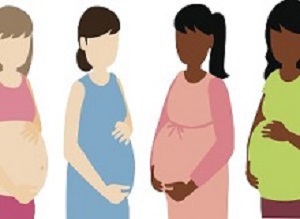 A King’s College London study has found that 1 in 4 pregnant women has mental health problems. This is more common than previously thought – but two simple questions can help identify these problems so that women can be treated.
A King’s College London study has found that 1 in 4 pregnant women has mental health problems. This is more common than previously thought – but two simple questions can help identify these problems so that women can be treated.
It is the first UK study to examine the prevalence of mental health problems or mental disorders when seen by a midwife for pregnancy care.
They found that when interviewed with a diagnostic gold standard interview, 1 in 4 women had a mental illness – not only depression (found in 11%) and anxiety (found in 15%), but also eating disorders (2%), obsessive-compulsive disorder (2%), PTSD in just under 1% and less commonly, bipolar disorder and other disorders.
It is already known that mental illness during pregnancy is associated with adverse outcomes for women, the pregnancy itself, and for the child from birth through to adolescence. It is therefore vital that these disorders are diagnosed as early as possible. The researchers sought to establish the best way of identifying problems.
The National Institute for Health Research (NIHR)-funded study went on to evaluate how well a two-question screen (known as the Whooley questions) which is asked by midwives, identified these disorders and compared with a 10 item self-complete questionnaire known as the Edinburgh Postnatal Depression Scale (EPDS), used in many countries internationally, and compared both methods with a gold standard diagnostic interview. The researchers recruited 545 pregnant women, over the age of 16, attending their antenatal booking appointment at an inner city maternity service in South-east London between November 2014 and June 2016.
They found that the two-questions asked by midwives performed similarly well in identifying whether a woman had “any disorder” compared with the 10-question self-complete EPDS measure. There was also evidence that identification of depression was more difficult to identify in older women than younger women.
Louise Howard, professor of women’s mental health, section of women’s mental health, Institute of Psychiatry, Psychology & Neuroscience at King’s College London, report author, said: “In clinical practice, maternity professionals need to identify whether or not a woman has any mental disorder, not only mood disorders which until recently have been the main focus of concern. It is therefore encouraging that, in this study, there was little difference in diagnostic accuracy between the commonly used tools – the Whooley questions and the EPDS – in identifying a mental disorder.”
“This study supports the NICE recommendation that women should be asked, by a non-judgemental and supportive health professional, at all contacts in pregnancy and after birth about their emotional wellbeing and are given the opportunity to respond to these structured questions (the Whooley or the EPDS). A positive identification then needs to be followed by a clinical assessment by an appropriate health practitioner to establish the clinical diagnosis and appropriate intervention.”
Maria Bavetta, co-founder of Maternal OCD, said: “This study shows how vital it is for pregnant women to be asked the right questions at the right time with a non-judgemental space to be listened to. I wish I had been given the opportunity to share my thoughts in a way that would have helped me access specialist maternal mental health services quicker – this is a duty we need to fulfil as every mum should have the right to be the mummy they want to be.”
This paper summarises independent research funded by the NIHR, the NIHR/Wellcome Trust King’s Clinical Research Facility and the NIHR Biomedical Research Centre at South London and Maudsley NHS Foundation Trust and King’s College London.
Abstract
There is limited evidence on the prevalence and identification of antenatal mental disorders.
To investigate the prevalence of mental disorders in early pregnancy and the diagnostic accuracy of depression-screening (Whooley) questions compared with the Edinburgh Postnatal Depression Scale (EPDS), against the Structured Clinical Interview DSM-IV-TR.
Cross-sectional survey of women responding to Whooley questions asked at their first antenatal appointment. Women responding positively and a random sample of women responding negatively were invited to participate.
Population prevalence was 27% (95% CI 22–32): 11% (95% CI 8–14) depression; 15% (95% CI 11–19) anxiety disorders; 2% (95% CI 1–4) obsessive–compulsive disorder; 0.8% (95% CI 0–1) post-traumatic stress disorder; 2% (95% CI 0.4–3) eating disorders; 0.3% (95% CI 0.1–1) bipolar disorder I, 0.3% (95% CI 0.1–1%) bipolar disorder II; 0.7% (95% CI 0–1) borderline personality disorder. For identification of depression, likelihood ratios were 8.2 (Whooley) and 9.8 (EPDS). Diagnostic accuracy was similar in identifying any disorder (likelihood ratios 5.8 and 6).
Endorsement of Whooley questions in pregnancy indicates the need for a clinical assessment of diagnosis and could be implemented when maternity professionals have been appropriately trained on how to ask the questions sensitively, in settings where a clear referral and care pathway is available.
L.M.H. chaired the National Institute for Health and Care Excellence CG192 guidelines development group on antenatal and postnatal mental health in 2012–2014.
Authors
Louise Michele Howard, Elizabeth G Ryan, Kylee Trevillion, Fraser Anderson
[link url="http://blog.journals.cambridge.org/2018/01/05/1-in-4-pregnant-women-have-mental-health-problems/"]Cambridge University material[/link]
[link url="https://www.cambridge.org/core/journals/the-british-journal-of-psychiatry/article/accuracy-of-the-whooley-questions-and-the-edinburgh-postnatal-depression-scale-in-identifying-depression-and-other-mental-disorders-in-early-pregnancy/A317DC7FBD645FB34FF8A1D2E2762A5F"]British Journal of Psychiatry abstract[/link]
